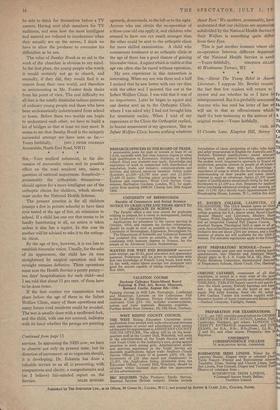SIR,—Your medical columnist, in his dis- cussion of monocular vision
and its possible effect on the road accident rate, raises a question of national importance. Somebody— presumably the orthoptists themselves— should agitate for a more intelligent use of the orthoptic clinics for children, which already exist under the National Health Scheme.
The present practice is for all children (except a few in private schools) to have their eyes tested at the age of five, on admission to school. If a child has one eye that seems to be hardly functioning at all, no action is taken unless it also has a squint. In this case its mother will be advised to take it to the orthop- tic clinic.
By the age of five, however, it is too late to establish binocular vision. Usually, for the sake of its appearance, the child has its eyes straightened by surgical operation and the eyesight remains defective. These operations must cost the Health Service a pretty penny— ten days' hospitalisation for each child—and I am told that about 15 per cent. of them have to be done twice.
If the first routine eye examination took place before the age of three in the Infant Welfare Clinic, many of these operations and many future road accidents could be avoided. The test is usually done with a cardboard fork, and the child, with one eye covered, indicates with its hand whether the prongs are pointing upwards, downwards, to the left or to the right. Anyone who can obtain the co-operation of a three-year old can apply it, and children who seemed to have one eye much stronger than the other could be sent to the orthoptic clinic for more skilled examination. A child who commences treatment at an orthoptic clinic at the age of three has a good chance of gaining binocular vision. A squint which is visible at this age can often also be cured without operation.
My own experience in this connection is interesting. When my son was three and a half I noticed that he saw better with one eye than with the other and I pointed this out at the Infant Welfare Clinic. I was told that it was of no importance. Later he began to squint and our doctor sent us to the Orthoptic Clinic, where I was asked why I had not brought him for treatment earlier. When I told of my experience at the Clinic the Orthoptist replied, in honest amazement at my ignorance, 'But an Infant Welfare Clinic knows nothing whatever
about Eyes.' We mothers, presumably, have understand that our children are mysterioa subdivided by the National Health Service 8 their Welfare is something quite differs from their Eyes.
This is just another instance where clef co-operation between different departme of the National Health Service is need(






























 Previous page
Previous page